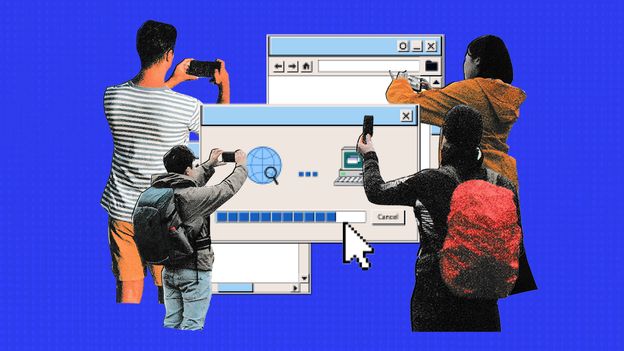I looked up “Buffy the Vampire Slayer” and there was the login screen, frozen in time since October 2003. I then tried Bebo, the long-gone social media platform I used in my pre-teens, and found 34,000 captures taken since 2000. My profile may be gone, but countless others have been saved, tiny windows into the lives of anonymous strangers from the past.
It reminded me of another site I spent hours bouncing around: eBaum’s World, famous for viral videos, games, crude humour and stolen content – a repository for memes before they even had a name. The archived copies of eBaum’s World perfectly encapsulate my early 2000s online experiences: a chaotic mish-mish of disparate interests. I found a page I remembered dedicated to celebrity soundboards. You could play audio clips through the phone and trick friends into thinking Jim Carrey was calling. There it was, saved for posterity.
Lost and found
One of Milligan’s favourite research subjects is GeoCities, one of the first platforms that made it easy for anyone to host their own page online. GeoCities shut down in 2009, but much is preserved in the Internet Archive. Browsing its pages is like a trip back in time, a vision of an era when the internet seemed as private as it was public. “People felt that not everything they would say would be tracked back to them,” Milligan says. “There’s a refreshing candour to it, a sense that people are really engaging without self-censoring themselves.”
GeoCities is perhaps best known for its graphic design, full of text in written in the font Comic Sans and the generous use of gifs. In fact, there’s an entire search engine dedicated to it called GifCities. Type in a word or phrase, and you’ll uncover mountains of animated digital folk art on the subject.
The Internet Archive isn’t the web’s only digital repository. In 2005, for example, Brügger helped launch the Danish Web Archive, committed to recording the nation’s one million web pages. “It’s really important that we preserve this cultural heritage, because it’s an important part of our life,” Brügger says.

